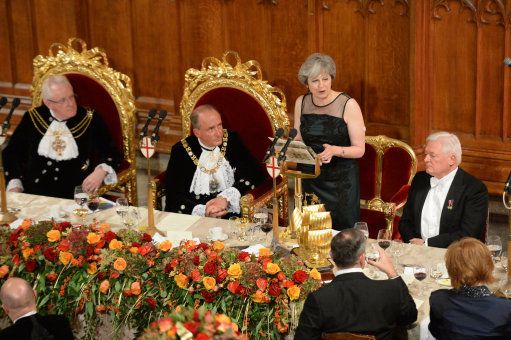It would be easy to forget that Theresa May supported Remain in last year's referendum if she didn't keep remaking the case. It isn't something she does intentionally. The prime minister's conversion to the Brexit cause was a condition of taking the job and her zeal has never flagged. But when she tries to express a vision of the UK's future relationship with its neighbours, she always makes proximity and strategic continuity sound more appealing than separation.
May's latest foray into foreign policy—never her favourite subject—was at the Lord Mayor's Banquet in London earlier this week. The top news line to come out of the speech was a warning that Russia is seeking to sabotage western democracy. Since one of the apparent applications of Kremlin cyber-meddling in UK politics was to inflame divisions during the EU referendum and, ultimately, tilt the result towards Brexit, this is tricky terrain for the prime minister. It turns out that the over-arching purpose of her government is aligned with an agenda supported by Moscow-sponsored troll-factories.
Whether or not the digital push from the east made a meaningful difference to ballot returns in the UK last June is another question. It should certainly cause discomfort that Vladimir Putin, in May's own analysis, has an interest in sowing division among western states and that Brexit achieves exactly that goal.
May's speech was arranged as a defence of global cooperation and solidarity as expressed through the institutions and treaties that underpinned western security in the second half of the 20th Century:
And what does May think should be the remedy?
“Our starting point must be to strengthen the commitment, purpose and unity of those allies and partners with whom we have built this order. Central to this must be the enduring strength of our transatlantic partnership and our relationships with our European allies.”
This is a restatement of British foreign policy orthodoxy—the strategic bridge between Washington and continental Europe. It will not have escaped May's attention that a vital transmission mechanism for UK diplomatic leverage in this model is participation in the European Union project. One of the assets that London brings to its informal “special” relationship with the US is its primacy as one of the top players in Brussels—one of the “big three,” alongside France and Germany.
"Brexiters could never accept that the EU was a forum where UK power was respected and wielded with effect"We know that the prime minister is worried that Brexit will be perceived as a surrender of that asset. The speech she made in Florence in September, advertised as a gesture of reassurance to EU capitals, began with a survey of global hazards best addressed through solidarity among democratic states.
“The weakening growth of global trade; the loss of popular support for the forces of liberalism and free trade that is driving moves towards protectionism; the threat of climate change depleting and degrading the planet we leave for future generations; and most recently, the outrageous proliferation of nuclear weapons by North Korea with a threat to use them.
Here on our own continent, we see territorial aggression to the east; and from the South threats from instability and civil war; terrorism, crime and other challenges which respect no borders.
The only way for us to respond to this vast array of challenges is for likeminded nations and peoples to come together and defend the international order that we have worked so hard to create—and the values of liberty, democracy, human rights and the rule of law by which we stand... Britain has always—and will always—stand with its friends and allies in defence of these values.”
This could easily have been the preamble to a speech in defence of Britain's EU membership. And that impression was not dispelled when May came to the passage explaining how she imagined relations across the Channel might evolve in the coming years:
“We are also proposing a far reaching partnership on how we protect Europe together from the threats we face in the world today; how we work together to promote our shared values and interests abroad; whether security, spreading the rule of law, dealing with emerging threats, handling the migration crisis or helping countries out of poverty.”
Naturally, May believes that Brexit will not inhibit the pursuit of those ambitions. She has internalised the rhetoric of the Leave campaign that belittled or denied the function of EU membership in amplifying UK influence. It was axiomatic to the eurosceptic cause that the opposite was true; that Brussels was an airless place where British power suffocated. Brexiters could never accept that the EU was a forum where UK power was respected and wielded with effect.
It is revealing how defensive the prime minister still sounds when trying to combine enthusiasm for Brexit with hard-headed appraisal of her country's strategic interests in relation to the European project. Her arguments betray recognition that her audience of EU leaders sees withdrawal from the EU as a self-harming retreat from the diplomatic premier league. This is hardly surprising since pretty much every overseas government and every living former prime minister of the UK believes that to be the case.
And, crucially, May believed it once, too. It is worth revisiting the one substantial intervention she made in the referendum campaign. In April 2016, then as Home Secretary, May set out her reasons for supporting ongoing EU membership. The pivotal argument, as she expressed it, was the point about amplification of power and influence:
“In essence, the question the country has to answer on 23rd June—whether to Leave or Remain—is about how we maximise Britain’s security, prosperity and influence in the world, and how we maximise our sovereignty: that is, the control we have over our own affairs in future.
I use the word 'maximise' advisedly, because no country or empire in world history has ever been totally sovereign, completely in control of its destiny.”
Yes, she really did say that. She went on to list the various advantages of cooperation through a rules-based multinational institution, with a particular emphasis on combatting crime and guaranteeing security (the topic best matched to her Home Office portfolio). May also strayed onto the benefits of economic integration, including a warning that the pursuit of unilateral free trade deals elsewhere around the world was not adequate inducement to surrender the unique benefits of the single market.
“It is not realistic to think we could just replace European trade with these new markets.”
Yes, she really did say that, too.
There was also a passage denigrating over-zealous EU harmonisation, a recapitulation of British cultural exceptionalism and a gripe about immigration. But, in peroration, May concluded that Britain's influence in the world was best exercised within the EU and that the case for staying could be cast through a patriotic lens—as a sign of confidence that the sovereign national interest was undiluted and unimpeded by positive engagement with our continental allies through the existing institutions; that other ways would be less effective.
"May is starting to feel the glass pressing against her nose as she peers in from the outside—and she doesn't like it"It is possible she confected that argument as a way of squaring eurosceptic impulses with a pragmatic expectation that Remain would win. But May is not an exceptionally duplicitous politician. She has all manner of political failings but flagrant, bare-faced lying is not her trademark vice. It seems more likely that the only Remain argument she ended up making was the one she felt she could take to the public—because it was the one she believed.
That would be consistent with her political formation in the Home Office. Her primary concern is security. Colleagues who sat alongside her in David Cameron's cabinet report that she never showed much of an interest in economics or trade. Nor was she especially engaged in EU affairs, except where they had an impact on borders and policing matters. It is easy to see how, in light of the referendum result, she could be persuaded that EU membership must be sacrificed on the altar of immigration control. She was easily persuaded that the single market had to be abandoned too, since free movement of labour was a non-negotiable component.
But the rest of the strategic calculus in May's old argument is unchanged. And if what the prime minister says about organised Russian hostility to the rules-based international architecture is true, her old argument has become even stronger.
Debate in Westminster since last June has mostly lurched around the economic arena, but it has not really touched on the question of diplomatic reach. The UK went into Brexit negotiations with an assumption that some unique status in future EU relations would be available. Brussels would recognise not just the value of Britain's economy to the bloc but its specialness as a global player. May and David Davis believed—and perhaps still believe—that the UK might retain something of its Big Country status in European terms, only without being one of the “Big Three” chairs at the European Council. As every EU leader and official has made clear on many occasions, that isn't an option.
So May is now starting to appreciate what it means to be a third-party country dealing with the EU as a bloc of 27. She is starting to feel the glass pressing against her nose as she peers in from the outside. And she doesn't like it. This is the subtext to those foreign policy speeches. They are set up as explanations of purpose, but come across as pleas for relevance. They are drafted to demonstrate Britain's ongoing commitment to multilateral engagement with challenges facing Europe. But they never explain how meeting those challenges is made easier by the policy May has chosen.
She is arguing against her former self, willing her pre-referendum judgement to be wrong. But it wasn't. There is a term for the “deep and special partnership” May is seeking with the rest of Europe. That term contains the reason why she just can't quite seem to express how her ambitions can be achieved through Brexit. The relationship she has in mind is called “membership of the European Union.”
Rafael Behr is a political columnist for the Guardian












